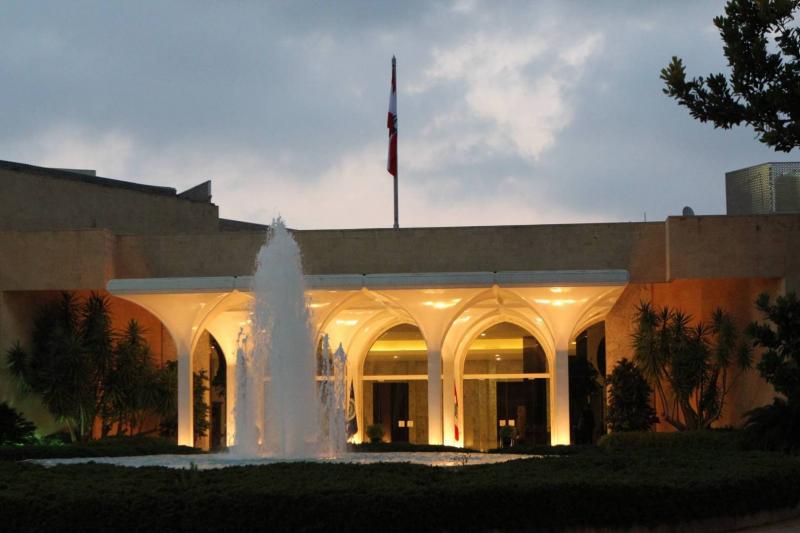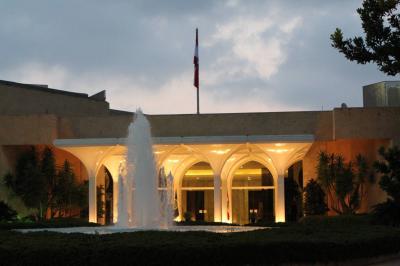In light of the deadly political stalemate, as we await the return of French presidential envoy Jean-Yves Le Drian to Beirut to know what he has regarding his presidential mission, the activity on the diplomatic front seems vibrant and notable. This is evidenced by the simultaneous visit of U.S. Energy Security Advisor Amos Hochstein with Iranian Foreign Minister Hossein Amir-Abdollahian, leading to numerous questions in the media about whether these visits were coordinated or if their timings coincided by chance. However, a former foreign minister stated in a conversation with "Wardena" that there is no linkage or coordination between the diplomats, although there must be some common goals, including the presidency, despite differing priorities.
It should also be noted that everyone has observed a change or softening in positions, both on an internal level with statements made by Parliament Speaker Nabih Berri on the 45th anniversary of the disappearance of Imam Moussa Sadr and his companions. He called on parliamentary bloc leaders to discuss under the parliament dome in September for a maximum of seven days, after which open and successive sessions would follow, without mentioning his presidential candidate, the head of the "Marada Movement," Sleiman Frangieh.
Externally, Amir-Abdollahian's statements at a press conference held after his arrival at Rafic Hariri International Airport from Damascus caught attention. He said: "During the discussions we will hold in Lebanon, we will urge all parties to reach agreements that would lead to electing a president." He revealed, "We heard from the Saudi officials during our discussions that positive and constructive statements regarding support for Lebanon were made," noting that "various regional and international parties are expected to support Lebanon economically and commercially to improve the country's economic situation."
In this context, one of the deputies told our site that Amir-Abdollahian wanted to convey a positive message to both the internal and external audiences, indicating that Iran does not obstruct the presidential path in Lebanon, especially after recent statements by French President Emmanuel Macron that discussed Iranian interventions in Lebanese affairs. It is likely he will inform his allies in Lebanon to soften their positions or facilitate the presidential path, even though it is too early to discuss positives at this time. Moreover, the Iranian foreign minister deliberately revealed the atmosphere of his discussions with Saudi Arabia concerning Lebanese affairs, indicating that the Saudi-Iranian agreement created a new climate regarding Lebanon. Thus, it is not unlikely that Le Drian will bring a serious or more realistic initiative in the coming days.
However, according to an opposition MP, Amir-Abdollahian did not reveal anything new regarding Saudi Arabia, which has always wanted and continues to want the best for Lebanon, but it demands reforms before taking any steps toward Lebanon. If some prefer to be cautious and refrain from discussing positives today because media positions do not reflect reality, we must await actual and realistic results, especially since this is not the first time the visit of an American official coincided with that of an Iranian official in Lebanon, as this has happened multiple times, notably the visit of Iranian Foreign Minister Mohammad Javad Zarif to Beirut alongside U.S. Assistant Secretary of State David Hale in 2020. Years earlier, Hale's visit coincided with that of Amir-Abdollahian when he was an assistant to the Speaker of the Shura Council for International Affairs.
It is well-known that Lebanese files are linked to regional developments, particularly concerning Iranian-Saudi relations, and the results of the meetings Amir-Abdollahian held recently, including meetings with key Saudi leadership figures such as Crown Prince Mohammed bin Salman and Foreign Minister Prince Faisal bin Farhan, where the Lebanese file was discussed in much detail, especially the presidential entitlements, as well as his meeting with Qatari Foreign Minister Sheikh Mohammed bin Abdulrahman Al Thani in the last week of July, just a few days after the "Five-Nation Doha Meeting."
While Hochstein seems to prioritize the border demarcation file, as he considers he has succeeded in maritime demarcation, he is not far from the presidential entitlement, which is a priority for France. It is crucial for France to succeed in its endeavors in this regard and to regain a certain role in the region, specifically in Lebanon. There have been many questions about the "nice" positions and statements despite some opposition MPs, including those from the "Strong Republic" bloc, calling on Iran not to interfere in Lebanese affairs. They also view Berri's linking of dialogue with open sessions for electing a president as part of political extortion, as the constitution is clear regarding the election of the president. However, the "Strong Lebanon" bloc and the "Democratic Gathering" bloc support Berri's call for dialogue on the grounds that there is no way out of the deadlock without discussion and negotiation.
In any case, regardless of the positions regarding President Berri's call for dialogue and statements some consider to carry positive signals to meet the ongoing changes, the most important question for Lebanese people remains: will the movement of diplomats produce a breakthrough in the presidential entitlement? Will Amir-Abdollahian convey messages to his allies to facilitate the presidential entitlement, and therefore, might we witness a breakthrough in the presidency this September? One experienced politician answers, "Amir-Abdollahian must carry an Iranian message to his allies in Lebanon to help solidify the Saudi-Iranian agreement, which provides a glimmer of hope, but at the same time, we should not let our imaginations run too far."
Additionally, an informed source confirms to "Wardena" that the general atmosphere, the ongoing movements, and the dynamics we are witnessing, along with the positive statements from Hochstein, who spoke about the possibility of a solution for land borders, reflect that his meetings with officials were very good, in addition to statements from the Iranian foreign minister and Berri's comments yesterday. All this indicates that there is some development or international and regional movement occurring, and that the general atmosphere has changed compared to the previous phase. We may be closer than ever to the election of a president, but the recipe is not ready yet. The current question is: what is the deal or settlement that could produce a president, especially since Iran's involvement gives cause for optimism, even though it has not joined the five-nation committee, it has changed its approach regarding Lebanon and coordinates with this committee. What remains for us today is to await the maturation of the presidential recipe and to discover who the president will be.




